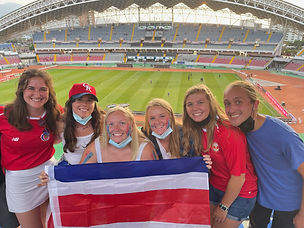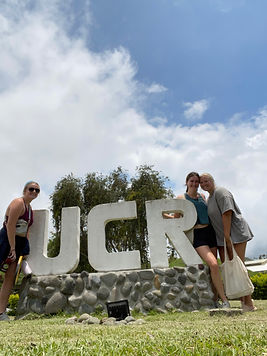San Ramón, Costa Rica



I studied abroad in San Ramón, Costa Rica in the Spring of 2022. I came in with an open mind, not knowing much about the culture of Costa Rica or what to expect, but excited nonetheless. The study abroad requirement was something that drew me to this program and after months of uncertainty with COVID, I was more than ready to start the semester.
After landing in San Jose and waiting for all the students to meet, we got on a bus for the hour ride to San Ramón. We were met by our host families outside the University of Costa Rica- Sede Occidente, and I met my host brother and my host mom. I would be spending the next four months with a sweet lady who had taken in students for over 20 years, and now did it to keep her company once her children moved out. She did not speak any English, and it took us some time but we quickly fell into a routine. She constantly had her grandchildren over, so it would not be a surprise to walk into my room to find her two granddaughters playing around. One of my favorite parts of the whole study abroad experience was the homestay- this allowed me to really feel like I was a part of the town, got to practice my Spanish all day everyday, and had a host brother who drove my friends and I all over Costa Rica on the weekends, showing us secret spots we could have never found ourselves.
The first month was a little difficult to adjust to the culture and new routine, it began to get easier. The climate of San Ramón was similar to what I experience at home, with warm days and a cool breeze at night which gave us some relief and helped me to sleep at night, as not many houses in the town had air conditioning, mine included. My host mom graciously made me food for breakfast, lunch, and dinner- she served me a mix of Costa Rican food and some American food to help ease the transition. The staples in the Costa Rican diet are rice and beans as meat can be very expensive, so I had that for most lunches and dinners. In terms of transportation, I walked to and from school, which was about a mile each way. The streets were not that crowded or dangerous so I enjoyed it most days. When we walked closer downtown, we had to be more careful with traffic because Costa Ricans do drive a little crazy. One of the greatest things about Costa Rica is its cheap public transportation. They have an extensive bus system that can be a little difficult to track, but once you are on the right bus, it will take you anywhere in the country. There was one weekend that we took an 8 hour bus ride across the country that cost us no more than 10 US dollars.
In terms of schooling, there were a lot of differences that made it a little challenging but made me learn a lot. The physical campus itself was a lot more open than another university- there were lots of green spaces right next to a forest with lots of wildlife. The windows were always open and there were stray dogs that walked in and out of the classrooms. In terms of the technology, it was very outdated and the WiFi was not great, but it did not really hinder my learning. I took classes in culture, literature, and grammar which significantly improved my Spanish speaking, writing, and listening skills. All of my professors spoke Spanish the whole time and it really helped to be immersed in the language. Towards the end of the semester, I found myself thinking in Spanish and although it wasn’t an overnight change, I was pretty much fluent at the end of the semester. I think that this can be attributed to the living situation I was in, the fact that most people in San Ramón only spoke Spanish, and that our classes were very discussion based so participation was a critical part of the class.
Instead of an internship abroad, we had to do research as the COVID precautions did not allow us into the hospitals or clinics. We had a professor who was also a doctor who was our “research advisor” and was supposed to provide us with feedback. I chose the topic of period poverty and its effects on Latina women in Latin America. Period poverty is the lack of products and education that women in mostly developing countries, but is everywhere. I chose this topic because I noticed that there were no tampons available at any store in Costa Rica and when I looked it up, I learned about this concept. Throughout the semester, I created a literature review in Spanish, discussing the topic, current campaigns to reduce this disparity and create educational programs, and other suggestions for intervention. This topic was fascinating for me to learn about- not only about its prevalence in Latin America and the taboos surrounding menstruation, but just its prevalence around the world. This research helped to ignite my passion for women’s health and find a niche career that I would be interested in pursuing. The research was done mostly on our own, with our professor not really helping, but we had to present our findings, in Spanish, with him at the end. Although I feel that my project was done without much mentorship, it was a great learning experience and a Spanish artifact to show potential employers.
Overall, my study abroad experience was an integral part of my college years that allowed me to increase my knowledge, my Spanish skills, and my cultural competencies– all of which are important aspects of our unique degree program. I not only increased my knowledge, but my confidence in my traveling abilities and my comfort with getting out of my comfort zone. I met great friends and have a family in Costa Rica forever.


